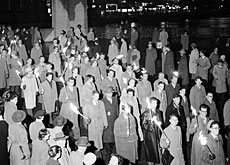Grateful Hungary thanks Switzerland

October 23 marks the 50th anniversary of Hungary's 1956 uprising, which was put down by Soviet troops a couple of weeks later.
Swiss President Moritz Leuenberger was one of the many heads of states invited to a ceremony in Budapest on Sunday, in recognition of the welcome given by Switzerland to thousands of Hungarian refugees at the time.
Hungarians commemorated the 1956 uprising at the capital city’s imposing parliament building. At the time, hopes for freedom and democracy were strong, but it was to take another 33 years for real freedom to emerge, following the collapse of the Communist regimes of Eastern Europe.
To mark the occasion, Hungary invited representatives from countries which received the 200,000 refugees who fled after the uprising was crushed. Switzerland offered refuge to almost 14,000 Hungarian refugees.
Wave of solidarity
In 1956 the fate of the Hungarian people stirred deep emotions in Switzerland, giving rise to the greatest spontaneous outburst of solidarity of the post-war period.
As early as 29 October, several thousand students staged a demonstration in Zurich in support of the Hungarian uprising. The demonstrators founded an association, with the aim of giving practical help.
Within just a couple of days, they had collected tens of thousands of francs and tons of food, clothes, medicines and blood supplies donated by hundreds of students. A first convoy of trucks left for Hungary on the evening of October 30, a second on November 2.
By 4 November, when Soviet tanks intervened to suppress the uprising, the students’ spirit of solidarity had spread to the rest of the Swiss population.
Massive protests took place in a number of cities, and dozens of collections were organised with a view to sending aid of all kinds. Trucks, trains and aeroplanes were made available to transport the supplies.
Musicians gave concerts for free and in some companies executives and workers gave up their bonuses or end-of-year party, wanting to use the money in support of Hungary. In schools, boys and girls began knitting thousands of blankets.
On November 20, by which time the uprising had been crushed by the Soviet army, Switzerland observed a three-minute silence in homage to the estimated 2,600 victims of the repression.
Refugees arrive
The wave of solidarity continued with the arrival in Switzerland of the Hungarian refugees.
The Swiss government decided to receive between November and December 14,000 refugees who had been living in crowded conditions in makeshift camps in Austria.
Transported by special trains, the exiles were greeted in stations along the route by thousands of people who gave them food, clothes and presents.
The refugees were initially accommodated in army barracks, public buildings, hotels and guest houses, and over the following months were divided among all the Swiss cantons.
Often it was local people who offered the newcomers accommodation and opportunities for employment or training. Despite communication problems and cultural differences, the new arrivals from the East were rapidly assimilated.
The help given to the Hungarians was not just the result of generosity, say historians. Other factors included anti-Communism and the need for labour during the economic boom of the 1950s.
swissinfo, Armando Mombelli
Roughly 4,000 Hungarian citizens are resident in Switzerland.
Some 1,600 Swiss nationals live in Hungary.
Most of these are former Hungarian refugees who chose to return to their country of origin after reaching retirement age in Switzerland.
On October 23, 1956, a student demonstration in Budapest turned into a massive protest march against the Communist regime, with more than 100,000 people taking part.
On October 24, the people went out on the streets in a number of other Hungarian cities demanding freedom of the press and freedom of speech, free elections and independence from the Soviet Union.
On November 4, the uprising was suppressed by Soviet troops. During the clashes, which lasted for about ten days, 2,600 Hungarians lost their lives. Thousands of people were imprisoned and hundreds executed.
Between November and December, 200,000 Hungarians fled to Western Europe. Switzerland received almost 14,000 refugees.

In compliance with the JTI standards
More: SWI swissinfo.ch certified by the Journalism Trust Initiative


You can find an overview of ongoing debates with our journalists here. Please join us!
If you want to start a conversation about a topic raised in this article or want to report factual errors, email us at english@swissinfo.ch.